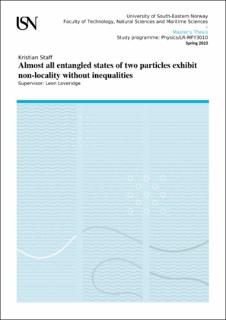| dc.description.abstract | This thesis investigates the constraints put on hidden-variables models by Hardy’s argument. We provide a detailed derivation of three different presentations of Hardy’s argument and demonstrate that a class of hidden-variables models cannot reproduce the predictions calculated from the mathematical formalism of quantum mechanics. This demonstration utilises a valuation function that, under mild criteria, fails to assign pre-existing values to certain physical quantities in specified pure quantum states. We elaborate upon and clarify the distinction between the quantum mechanical framework and the hidden-variables model, which has been left implicit by other authors. We address the limitations of the argument when applied to maximally entangled states, and substantiate the assertion that the argument remains valid for all pure entangled states, excluding those that are maximally entangled. | |
